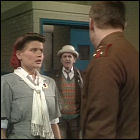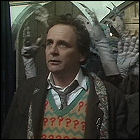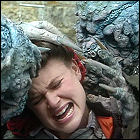 The Doctor and Ace arrive at a soggy British naval camp in 1943, into which the Time Lord confidently strides, not even attempting to conceal his presence. He mingles with the base’s disturbed commander and the brilliant but paranoid Dr. Judson, creator of the Ultima code-breaking device. The Doctor and Ace later encounter a small platoon of Russian commandos who plan to steal Ultima – a move which has been anticipated. In the background lurks a devious alien presence with whom the Doctor has an old score to settle – provided that the humans in the naval camp, merely pawns in a much more complex game, don’t destroy their own world first.
The Doctor and Ace arrive at a soggy British naval camp in 1943, into which the Time Lord confidently strides, not even attempting to conceal his presence. He mingles with the base’s disturbed commander and the brilliant but paranoid Dr. Judson, creator of the Ultima code-breaking device. The Doctor and Ace later encounter a small platoon of Russian commandos who plan to steal Ultima – a move which has been anticipated. In the background lurks a devious alien presence with whom the Doctor has an old score to settle – provided that the humans in the naval camp, merely pawns in a much more complex game, don’t destroy their own world first.
written by Ian Briggs
directed by Nicholas Mallett
music by Mark Ayres
Cast: Sylvester McCoy (The Doctor), Sophie Aldred, Dinsdale Landen (Dr. Judson), Alfred Lynch (Commander Millington), Tomek Bork (Sorin), Joann Kenny (Jean), Joanne Bell (Phyllis), Peter Czajkowski (Sergeant Prozorov), Nicholas Parsons (Reverend Wainwright), Cory Pulman (Kathleen Dudman), Marek Anton (Vershinin), Stevan Rimkus (Captain Bates), Marcus Hutton (Sergeant Leigh), Janet Henfrey (Ms. Hardaker), Anne Reid (Nurse Crane), Mark Conrad (Petrossian), Christien Anholt (Perkins), Aaron Hanley (Baby), Raymond Trickett (Ancient Haemovore), Cy Town (Haemovore)
Broadcast from October 25 through November 15, 1989
LogBook entry & review by Earl Green
Review: Possibly the quintessential seventh Doctor story, this four-parter shows the Doctor at his darkest, having once again already planned the game that is played out across time and space, culminating in this confrontation in a seemingly out-of-the-way location. The Curse of Fenric, though it was the  penultimate Doctor Who story broadcast, also set the tone for Virgin Publishing’s New Adventures series of novels which began publication in 1991 – in these books, as in this story, the Doctor uses Ace as both bait and bloodhound for the alien menace, regardless of her feelings. Another frequent plot device borrowed from Fenric, though it was used earlier in Remembrance Of The Daleks and Silver Nemesis, portrays the Doctor as a master manipulator against whom the alien menace never stood a chance. In its third recurrence in the TV series, this storyline was already becoming a bit predictable, but the first three years of the New Adventures books recycled the “Doctor-as-manipulator” element ad nauseum.
penultimate Doctor Who story broadcast, also set the tone for Virgin Publishing’s New Adventures series of novels which began publication in 1991 – in these books, as in this story, the Doctor uses Ace as both bait and bloodhound for the alien menace, regardless of her feelings. Another frequent plot device borrowed from Fenric, though it was used earlier in Remembrance Of The Daleks and Silver Nemesis, portrays the Doctor as a master manipulator against whom the alien menace never stood a chance. In its third recurrence in the TV series, this storyline was already becoming a bit predictable, but the first three years of the New Adventures books recycled the “Doctor-as-manipulator” element ad nauseum.
But that was in the future, and the fondness future writers showed for the Fenric “formula” is evidence of the powerful and mold-breaking nature of this story. The entire cast – with the possible exception of some of the Russian soldiers and the two  delinquent girls – is remarkably convincing, and Sylvester McCoy and Sophie Aldred hit their stride outstandingly, again coloring future writers’ portrayals of their characters. At times, however, the story seems to take quantum leaps forward. Some of these huge jumps in the plot are compensated by additional scenes included in the commercial video release which weren’t broadcast due to time constraints, explaining some of the apparent gaps in the logic of the story.
delinquent girls – is remarkably convincing, and Sylvester McCoy and Sophie Aldred hit their stride outstandingly, again coloring future writers’ portrayals of their characters. At times, however, the story seems to take quantum leaps forward. Some of these huge jumps in the plot are compensated by additional scenes included in the commercial video release which weren’t broadcast due to time constraints, explaining some of the apparent gaps in the logic of the story.
Something else to seek out aside from the commercial video release of Fenric is Ian Briggs’ novelization of his own scripts for Target Books, though the book may be hard to find outside of used bookstores. The novel, just one of the series of books based on the series, excels because of the wealth of related material which wasn’t  part of the original script. Some observers feel that the novelization of The Curse of Fenric set the pace for the earliest books in the New Adventures series; it also included a prologue, set well after the TV show’s conclusion, with an older Ace who had long ago parted company with the Doctor – and such was the impact of the Fenric novel that later New Adventures writers went to great lengths to preserve this epilogue, which could just as easily have been considered unofficial. Also available is a CD of Mark Ayres’ excellent musical score for the show, including cues which only appeared on the video release.
part of the original script. Some observers feel that the novelization of The Curse of Fenric set the pace for the earliest books in the New Adventures series; it also included a prologue, set well after the TV show’s conclusion, with an older Ace who had long ago parted company with the Doctor – and such was the impact of the Fenric novel that later New Adventures writers went to great lengths to preserve this epilogue, which could just as easily have been considered unofficial. Also available is a CD of Mark Ayres’ excellent musical score for the show, including cues which only appeared on the video release.

